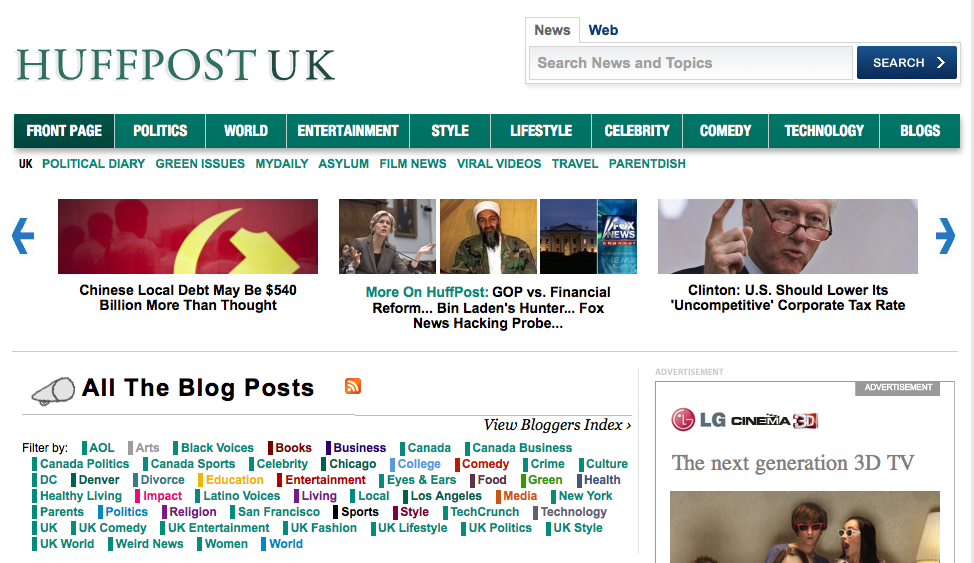 Journalisted is an independent, not-for-profit website built to make it easier for you, the public, to find out more about journalists and what they write about. It is run by the Media Standards Trust, a registered charity set up to foster high standards in news on behalf of the public, and funded by donations from charitable foundations.Each week Journalisted produces a summary of the most covered news stories, most active journalists and those topics falling off the news agenda, using its database of UK journalists and news sources.
Journalisted is an independent, not-for-profit website built to make it easier for you, the public, to find out more about journalists and what they write about. It is run by the Media Standards Trust, a registered charity set up to foster high standards in news on behalf of the public, and funded by donations from charitable foundations.Each week Journalisted produces a summary of the most covered news stories, most active journalists and those topics falling off the news agenda, using its database of UK journalists and news sources.
(More) Wimbledon, pensions, Greece riots, & DSK
for the week ending Sunday 3 July
- Greece, pensions strikes and DSK grip headlines
- Wimbledon courts attention on back pages
- Bombs in Nigeria, and pharmacy drug shortages, covered little
Covered lots
- Week two at Wimbledon, with Novak Djokovic winning the men’s and Petra Kvitová winning the women’s finals, each for the first time, 1,329 articles
- The public-sector pensions strikes last Thursday, with 750,000 reportedly not going to work and more than 3,000 schools closing in England and Wales, 283 articles
- Greece’s financial crisis, with clashes between protesters and riot police in Athens as Greek parliament votes in favour of austerity measures, 145 articles
- Dominique Strauss-Kahn released without bail, as the case of sexual assault against him nearly collapsed, 135 articles
Covered little
- The start of the FIFA Women’s world cup, 17 articles
- Moroccans vote in referendum for constitutional reforms to limit the monarchy’s power, 12 articles
- The trial of the four surviving Khmer Rouge leaders begins in Cambodia, 10 articles
- A series of bomb attacks on bars in Nigeria by suspected Islamist militants, with at least 30 reported dead, 4 articles
- Drug shortages in pharmacies, ‘putting lives at risk’, 1 article
Political ups and downs (top ten by number of articles)
- David Cameron: 535 articles (-27% on previous week)
- Ed Miliband: 208 articles (+13% on previous week)
- George Osborne: 174 articles (-18% on previous week)
- Michael Gove: 140 articles (+26% on previous week)
- Tony Blair: 114 articles (+19% on previous week)
- Alex Salmond: 102 articles (-22% on previous week)
- Nick Clegg: 93 articles (-40% on previous week)
- Gordon Brown: 77 articles (-21% on previous week)
- Jeremy Hunt: 74 articles (+45% on previous week)
- Liam Fox: 73 articles (+28% on previous week)
Celebrity vs serious
- Carolyn Bourne, a mother-in-law from hell (or a PR stunt?), 59 articles vs. a a Taliban suicide attack and gun siege on a landmark hotel near Kabul, killing 11, 44 articles
- Kate Moss’s £1 million wedding, 44 articles vs. drought and starvation returning to the Horn of Africa, 14 articles
- The Duke and Duchess of Cambridge visiting Canada, 133 articles vs. the sister of former PM Thaksin Shinawatra elected to lead Thailand, 35 articles
Arab spring (countries & current leaders)
- Libya and Colonel Gaddafi, 119 articles (-19% on previous week)
- Syria and President Bashar Al-Assad, 42 articles (-60% on previous week)
- Gaza and Hamas, 21 articles (+40% on previous week)
- Morocco and King Mohammed VI, 12 articles (+300% on previous week)
- Iran and President Ahmadinejad, 10 articles (+0% on previous week)
- Lebanon and Najib Mikati, 10 articles (+1,000% on previous week)
- Israel and Prime Minister Netanyahu, 9 articles (+13% on previous week)
- Bahrain and King Al Khalifa, 8 articles (+33% on previous week)
- Saudi Arabia and King Abdullah, 6 articles (+500% on previous week)
- Yemen and President Saleh, 5 articles (-69% on previous week)
- Turkey and Prime Minster Erdogan, 4 articles (-50% on previous week)
- Egypt’s Military Council, 3 articles (+50% on previous week)
- West Bank and President Abbas, 2 articles (-60% on previous week)
- Jordan and King Abdullah, 2 articles (-33% on previous week)
- Qatar and Emir Khalifa Al Thani, 2 articles (-33% on previous week)
Who wrote a lot about…’pensions’
Long form journalism
- 3,737 words: How Pakistan’s farmers are cleaning up cotton – Sally Williams, Telegraph, 27th June 2011
- 2,883 words: The full filthy Monte – Matthew Campbell, Sunday Times, 3rd July 2011
- 2,424 words: Cuts protests: where is the anger now? – Andy Beckett, The Guardian, 27th June 2011
More from the Media Standards Trust
For the latest instalment of Tobias Grubbe, journalisted’s 18th century jobbing journalist, go to journalisted.com/tobias-grubbe





